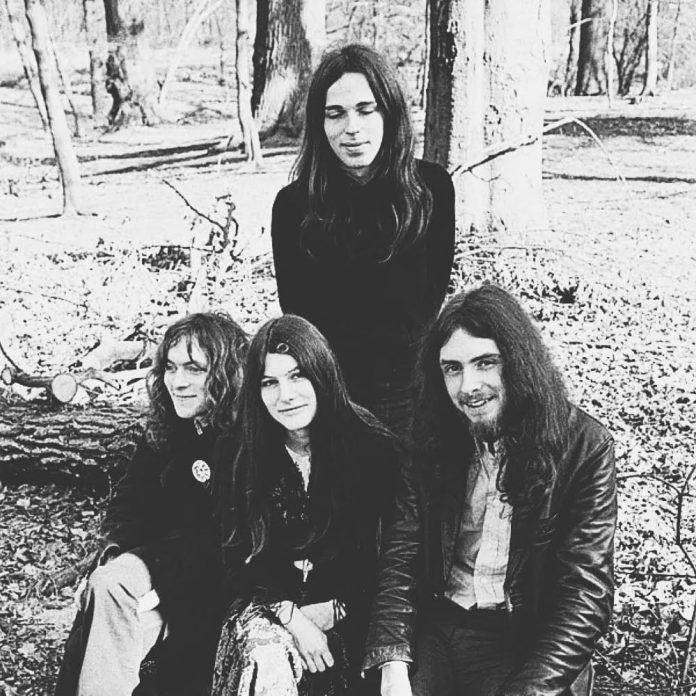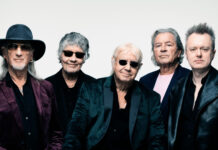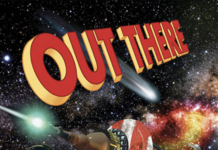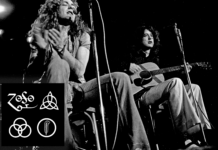Spirogyra were a British folk-rock band active between 1968-73, though the lyrical content in their music took them well beyond just being folk-rock, and the sound they produced was described as being ‘whimsically English.’ Martin Cockerham had founded the band in the unlikely settings of Bolton in 1968, along with friend Mark Francis, but it was at Kent University, Canterbury, in 1969 where the classic Spirogyra line-up of Cockerham (guitar/vocals), Barbara Gaskin (vocals), Steve Borrill (bass) and Julian Cusack (violin) got together. Initially, they were considered to be part of the fabled ‘Canterbury scene’ but this was tenuous and probably owed more to Geography than anything else, and also because Barbara Gaskin was introduced to Martin Cockerham by Steve Hillage.
This triple CD set is a welcome re-release of the three albums Spirogyra recorded between the years of 1971-73, with bonus tracks on the second and third discs, and while Cockerham and Gaskin remained as a constant presence, Cusack and Borrill left after their contributions to the first album, though they continued to contribute as guests later on.
Virtually all the songs were written by Cockerham, whose lyrics were a mix of astringent political comments coupled with a humanist perspective which took the band well beyond the ‘hippy dippy’ sentiments prevalent at the time. They also had the good fortune to be releasing their albums during a period when bands experimenting with sounds and lyrics and taking risks was all the rage.
Their debut album, St Radigunds, named after the street in Canterbury where the band were living, was essentially their ‘live’ set at the time, though the recorded versions featured Fairport’s Dave Mattacks on drums. It’s an adventurous and positive debut with good interplay between the musicians, and they were initially likened to Comus. However, where Comus were dark and demonic, Spirogyra were more politically inclined. Barbara Gaskin stated, “We were fervently anti-capitalist and anti-materialism. We rejected the status quo and believed in the power of music to change ideas.”
There’s a haunting beauty to several songs on the album, such as ‘Love Is A Funny Thing’, ‘We Were A Happy Crew’ and the delicate ‘The Future Won’t Be Long’. It was Julian Cusack’s violin which gave the band both an edge and a proggy feel, something missing from their next albums, and his song ‘Time Will Tell’, showed his violin skills to good effect. ‘Island’ and ‘Magical Mary’… “who looked like a fairy and waved her wand around”, are enthralling pieces of music, and album closer, the eight-minute ‘Duke Of Beaufort’ is an epic, even including hunting horns in the mix!
Album number two, Old Boot Wine followed in 1972 and, by this time, Julian Cusack had left to return to University, Mark Francis had rejoined on guitar and, with Dave Mattacks laying down a solid backbeat, tracks like ‘Dangerous Dave’, ‘Wings Of Thunder’ and bonus track ‘Melody Maker Man’, showed their heavier side and veered more towards rock than just folk, as St Radigunds had been largely acoustic. The sound and feel on this album was different without Cusack, his violin appearing only on ‘Grandad’, thus there was more keyboard and also electric guitar on this album than the violin sound which had been a standout feature on their debut album. This rendered them similar to Canterbury legends Caravan, whose sound had also changed when David Sinclair left.
That all being said, the album wasn’t all upbeat rock. ‘Van Allen’s Belt’ is a more subtle song with lovely harmonies between Cockerham and Gaskin, her silky smooth delivery nullifying the occasional harshness of his rasping voice, and their political side showed through on Steve Borrill’s ‘Disraeli’s Problem’, a song referencing the troubles in Northern Island, and one which namechecks the then Home Secretary, Reginald Maudling. Borrill also wrote the proggy-sounding ‘Runaway’ and sang lead vocals.

After the release of Old Boot Wine, which would prove to be the band’s least successful album, Spirogyra were left without a label while they were undergoing personnel changes, but they managed to secure a one-album deal with Polydor and went on to record what many fans considered to be their best work.
By the time of their third, and last, album, Bells Boots And Shambles, Spirogyra were now just Cockerham and Gaskin, as evidenced by the fact only these two appear on the album cover, with Borrill and Cusack only contributing as guests alongside other musos. It sold very poorly upon release, though is now considered to be one of the great classics of British ‘acid rock,’ with vinyl copies changing hands for up to £800. Cockerham now had complete artistic control and even brought in Dolly Collins to help with the arrangements.
The album is at its best when Barbara Gaskin makes her sublime vocal contributions, particularly on tracks such as ‘Old Boot Wine’, while the folky ‘Sergeant Says’ shows what’s missing when she doesn’t sing. ‘The Furthest Point’, however, is one of Spirogyra’s best songs, with its flute and acoustic guitar intro and good usage of the cello to provide a melancholic atmosphere, and ‘Parallel Lines Never Separate’ has a 60’s feel and Dylanesque overtones. It’s the thirteen-minute epic ‘In The Western World’ though that is the standout track, a song divided into four pieces, and all coming together joyously to conclude what is possibly Spirogyra’s best album.
After this, some demos were recorded but no new albums ever appeared as no record company wanted to offer a contract, so Spirogyra split, with Cockerham heading off to go travelling and Barbara Gaskin joining Hatfield & the North as one of the Northettes, and adding vocals to Egg’s album The Civil Surface.
Spirogyra achieved critical praise but little commercial success, though Barbara Gaskin enjoyed a number one single after pairing with David Stewart (ex-Egg) to release Lesley Gore’s ‘It’s My Party.’ Spirogyra, however, remains highly regarded as a band and their three albums were exemplars of the spirit of innovation prevalent in music at the time. The release of the three albums in this boxset will hopefully introduce their music to a new generation of fans and bring them some belated recognition, though Martin Cockerham is now sadly no longer of this parish.




















